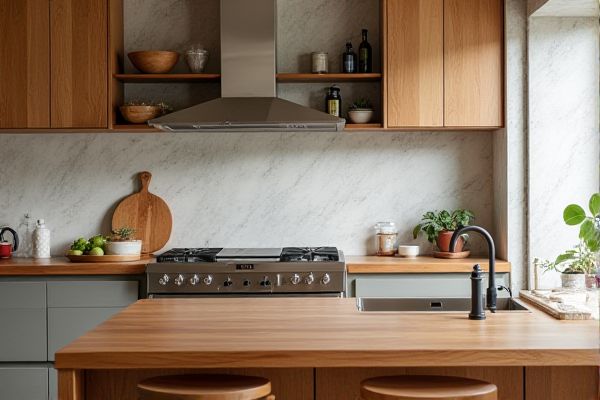
Butcher block countertops offer a warm, natural aesthetic and excellent knife-friendly surfaces ideal for food preparation, while stone countertops, such as granite or quartz, provide superior durability, heat resistance, and a sleek, modern look. Explore the rest of this article to determine which countertop best suits your kitchen style and functional needs.
Table of Comparison
| Feature | Butcher Block | Stone Countertop |
|---|---|---|
| Material | Hardwood (maple, oak, walnut) | Natural stone (granite, marble, quartz) |
| Durability | Moderate; prone to scratches and dents | High; resistant to heat and scratches |
| Maintenance | Requires regular oiling and sealing | Low; occasional sealing depending on type |
| Aesthetic | Warm, rustic, natural wood grain | Elegant, sleek, variety of colors and patterns |
| Cost | Moderate; $40-$100 per sq.ft. | Varies; $50-$200 per sq.ft. |
| Heat Resistance | Low to moderate; can scorch | High; withstands hot pots and pans |
| Repairability | Easy; can be sanded and refinished | Difficult; chips or cracks may require professional repair |
| Environmental Impact | Renewable resource; biodegradable | Non-renewable; quarrying impacts environment |
Introduction to Butcher Block and Stone Countertops
Butcher block countertops feature natural wood surfaces crafted by joining hardwood strips, offering warmth and a classic look ideal for kitchen workspaces. Stone countertops, such as granite, marble, or quartz, provide durable, heat-resistant surfaces with unique patterns and long-lasting strength. Your choice between butcher block and stone will affect maintenance, aesthetics, and functionality in your kitchen design.
Material Composition: Wood vs. Stone
Butcher block countertops are crafted from hardwoods like maple, oak, or cherry, offering natural warmth and a durable yet forgiving surface that can be sanded and resealed over time. Stone countertops, including granite, marble, and quartz, provide a hard, non-porous surface renowned for heat resistance and longevity, often requiring less maintenance but lacking the warmth of wood. Your choice depends on whether you prioritize the organic, tactile feel of wood or the robust, stain-resistant qualities of stone.
Aesthetic Appeal and Design Versatility
Butcher block countertops offer a warm, natural aesthetic with rich wood grain patterns that complement rustic, farmhouse, or traditional kitchen designs. Stone countertops, such as granite or quartz, provide a sleek, polished surface with a wide range of colors and veining options, enhancing modern and luxurious kitchen styles. Both materials deliver unique design versatility, with butcher block allowing for a cozy, organic feel and stone offering durability alongside elegant, high-end visual appeal.
Durability and Longevity
Butcher block countertops offer warm aesthetics and can last for decades with proper sealing and maintenance but are prone to scratches, dents, and water damage compared to stone countertops. Stone options like granite, quartz, and marble provide superior durability, resisting heat, stains, and wear, often lasting a lifetime with minimal upkeep. Choosing between butcher block and stone affects your kitchen's longevity and durability, so consider your lifestyle and maintenance willingness for the best fit.
Maintenance and Cleaning Requirements
Butcher block countertops require regular oiling to prevent drying and cracking, and cleaning should be done with mild soap and water to avoid damaging the wood surface. Stone countertops, such as granite or quartz, are more resistant to stains and scratches but often need periodic sealing to maintain their durability and appearance. Your choice depends on whether you prefer the warm, natural feel of wood with consistent upkeep or the low-maintenance resilience of stone surfaces.
Cost Comparison: Initial and Long-Term Investment
Butcher block countertops typically have a lower initial cost, ranging from $40 to $100 per square foot, while stone countertops such as granite or quartz can cost between $50 and $200 per square foot. Long-term investment differs as butcher blocks require periodic sealing and refinishing to prevent damage, which adds maintenance costs over time, whereas stone countertops are more durable and resistant to scratches and heat but may require occasional resealing. Your choice between butcher block and stone should factor in both upfront expenses and ongoing maintenance to balance aesthetics, durability, and budget effectively.
Heat and Scratch Resistance
Stone countertops, such as granite and quartz, offer superior heat resistance, allowing you to place hot pots and pans directly on the surface without damage. Butcher blocks, made from hardwood like maple or oak, are more prone to heat marks and can suffer scratches from knives or heavy use, though they can be sanded and resealed to restore their appearance. Choosing between butcher block and stone countertop depends on your kitchen's heat and scratch resistance needs, with stone providing greater durability and low maintenance.
Environmental Impact and Sustainability
Butcher block countertops, made from renewable hardwoods, offer a more eco-friendly option due to their biodegradability and lower carbon footprint during production compared to stone countertops, which require energy-intensive quarrying and processing. Wood surfaces can be sustainably sourced and refurbished through sanding and resealing, reducing waste over time, whereas stone countertops are less recyclable and often disposed of in landfills. Choosing FSC-certified butcher block wood enhances environmental sustainability by promoting responsible forest management and reducing deforestation impacts.
Installation Process and Considerations
Butcher block countertops offer a straightforward installation process, often requiring only a sturdy base and basic tools for securing the wood slabs. Stone countertops, such as granite or quartz, demand professional fabrication and precise measurement to accommodate heavy slabs and ensure proper support and sealing. Considerations include the weight and permanence of stone, which often necessitates reinforcement underneath cabinets, while butcher block requires regular sealing and maintenance to prevent damage from moisture.
Which Countertop is Right for Your Kitchen?
Butcher block countertops offer a warm, natural aesthetic with excellent knife-friendly surfaces, ideal for those who enjoy meal preparation and a rustic kitchen vibe. Stone countertops, such as granite or quartz, provide superior durability, heat resistance, and low maintenance, making them suitable for busy kitchens that require long-lasting and hygienic surfaces. Choosing between butcher block and stone hinges on prioritizing either natural warmth and repairability or robust, stain-resistant practicality.
 homyna.com
homyna.com